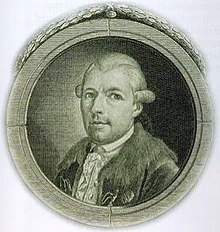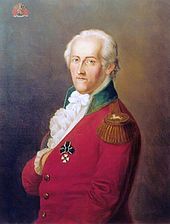
Adam Weishaupt (1748–1830), founder of the Illuminati
the history
The Illuminati (/ɪˌluːmɪˈnɑːti/; plural of Latin illuminatus, 'enlightened') is a name given to several groups, both real and fictitious. Historically, the name usually refers to the Bavarian Illuminati, an Enlightenment-era secret society founded on 1 May 1776 in Bavaria, today part of Germany. The society's stated goals were to oppose superstition, obscurantism, religious influence over public life, and abuses of state power. "The order of the day," they wrote in their general statutes, "is to put an end to the machinations of the purveyors of injustice, to control them without dominating them."[1] The Illuminati—along with Freemasonry and other secret societies—were outlawed through edict by Charles Theodore, Elector of Bavaria, with the encouragement of the Catholic Church, in 1784, 1785, 1787 and 1790.[2] During subsequent years, the group was generally vilified by conservative and religious critics who claimed that the Illuminati continued underground and were responsible for the French Revolution. It attracted literary men such as Johann Wolfgang von Goethe and Johann Gottfried Herder and the reigning Duke of Gotha and of Weimar.[3] In subsequent use, "Illuminati" has been used when referring to various organisations which are alleged to be a continuation of the original Bavarian Illuminati (though these links have not been substantiated). These organisations have often been accused of conspiring to control world affairs, by masterminding events and planting agents in governments and corporations, in order to gain political power, influence and to establish a New World Order. Central to some of the more widely known and elaborate conspiracy theories, the Illuminati are depicted as lurking in the shadows and pulling the strings and levers of power. This view of the Illuminati has found its way into popular culture, appearing in dozens of novels, films, television shows, comics, video games and music videos.
the oragins
Adam Weishaupt (1748–1830) became professor of Canon Law and practical philosophy at the University of Ingolstadt in 1773. He was the only non-clerical professor at an institution run by Jesuits, whose order Pope Clement XIV had dissolved in 1773. The Jesuits of Ingolstadt, however, still retained the purse strings and some power at the university, which they continued to regard as their own. They made constant attempts to frustrate and discredit non-clerical staff, especially when course material contained anything they regarded as liberal or Protestant. Weishaupt became deeply anti-clerical, resolving to spread the ideals of the Enlightenment (Aufklärung) through some sort of secret society of like-minded individuals
Finding Freemasonry expensive, and not open to his ideas, he founded his own society which was to have a system of ranks or grades based on those in Freemasonry, but with his own agenda.[4] His original name for the new order was Bund der Perfektibilisten, or Covenant of Perfectibility (Perfectibilists); he later changed it because it sounded too strange.[5] On 1 May 1776, Weishaupt and four students formed the Perfectibilists, taking the Owl of Minerva as their symbol.[6][7] The members were to use aliases within the society. Weishaupt became Spartacus. Law students Massenhausen, Bauhof, Merz and Sutor became respectively Ajax, Agathon, Tiberius and Erasmus Roterodamus. Weishaupt later expelled Sutor for indolence.[8][9] In April 1778, the order became the Illuminatenorden, or Order of Illuminati, after Weishaupt had seriously contemplated the name Bee order.
Massenhausen proved initially the most active in expanding the society. Significantly, while studying in Munich shortly after the formation of the order, he recruited Xavier von Zwack [de], a former pupil of Weishaupt, at the beginning of Zwack's significant administrative career. (At the time, he was in charge of the Bavarian National Lottery.) Massenhausen's enthusiasm soon became a liability in the eyes of Weishaupt, often resulting in attempts to recruit unsuitable candidates. Later, his erratic love-life made him neglectful, and as Weishaupt passed control of the Munich group to Zwack, it became clear that Massenhausen had misappropriated subscriptions and intercepted correspondence between Weishaupt and Zwack. In 1778, Massenhausen graduated and took a post outside Bavaria, taking no further interest in the order. At this time, the order had a nominal membership of twelve.
With the departure of Massenhausen, Zwack immediately applied himself to recruiting more mature and important recruits. Most prized by Weishaupt was Hertel, a childhood friend and a canon of the Munich Frauenkirche. By the end of summer 1778 the order had 27 members (still counting Massenhausen) in 5 commands; Munich (Athens), Ingolstadt (Eleusis), Ravensberg (Sparta), Freysingen (Thebes), and Eichstaedt (Erzurum).
During this early period, the order had three grades of Novice, Minerval and Illuminated Minerval, of which only the Minerval grade involved a complicated ceremony. In this the candidate was given secret signs and a password. A system of mutual espionage kept Weishaupt informed of the activities and character of all his members, his favourites becoming members of the ruling council, or Areopagus. Some novices were permitted to recruit, becoming Insinuants. Christians of good character were actively sought, with Jews and pagans specifically excluded, along with women, monks and members of other secret societies. Favoured candidates were rich, docile, willing to learn and aged 18–30.
Transition
Having, with difficulty, dissuaded some of his members from joining the Freemasons, Weishaupt decided to join the older order to acquire material to expand his own ritual. He was admitted to lodge "Prudence" of the Rite of Strict Observance early in February 1777. His progress through the three degrees of "blue lodge" masonry taught him nothing of the higher degrees he sought to exploit, but in the following year a priest called Abbé Marotti informed Zwack that these inner secrets rested on knowledge of the older religion and the primitive church. Zwack persuaded Weishaupt that their own order should enter into friendly relations with Freemasonry and obtain the dispensation to set up their own lodge. At this stage (December 1778), the addition of the first three degrees of Freemasonry was seen as a secondary project. With little difficulty, a warrant was obtained from the Grand Lodge of Prussia called the Royal York for Friendship and the new lodge was called Theodore of the Good Council, with the intention of flattering Charles Theodore, Elector of Bavaria. It was founded in Munich on 21 March 1779 and quickly packed with Illuminati. The first master, a man called Radl, was persuaded to return home to Baden and by July Weishaupt's order ran the lodge. The next step involved independence from their Grand Lodge. By establishing masonic relations with the Union lodge in Frankfurt, affiliated to the Premier Grand Lodge of England, lodge Theodore became independently recognised and able to declare its independence. As a new mother lodge, it could now spawn lodges of its own. The recruiting drive amongst the Frankfurt masons also obtained the allegiance of Adolph Freiherr Knigge.
Reform by Adolph Knigge

Adolph Freiherr Knigge, the most effective recruiter for the Illuminati
Knigge was recruited late in 1780 at a convention of the Rite of Strict Observance by Costanzo Marchese di Costanzo, an infantry captain in the Bavarian army and a fellow Freemason. Knigge, still in his twenties, had already reached the highest initiatory grades of his order and had arrived with his own grand plans for its reform. Disappointed that his scheme found no support, Knigge was immediately intrigued when Costanzo informed him that the order that he sought to create already existed. Knigge and three of his friends expressed a strong interest in learning more of this order and Costanzo showed them material relating to the Minerval grade. The teaching material for the grade was "liberal" literature which was banned in Bavaria, but common knowledge in the Protestant German states. Knigge's three companions became disillusioned and had no more to do with Costanzo, but Knigge's persistence was rewarded in November 1780 by a letter from Weishaupt. Knigge's connections, both within and outside of Freemasonry, made him an ideal recruit. Knigge, for his own part, was flattered by the attention and drawn towards the order's stated aims of education and the protection of mankind from despotism. Weishaupt managed to acknowledge, and pledge to support, Knigge's interest in alchemy and the "higher sciences". Knigge replied to Weishaupt outlining his plans for the reform of Freemasonry as the Strict Observance began to question its own origins.
Weishaupt set Knigge the task of recruiting before he could be admitted to the higher grades of the order. Knigge accepted, on the condition that he be allowed to choose his own recruiting grounds. Many other masons found Knigge's description of the new masonic order attractive and were enrolled in the Minerval grade of the Illuminati. Knigge appeared at this time to believe in the "Most Serene Superiors" which Weishaupt claimed to serve. His inability to articulate anything about the higher degrees of the order became increasingly embarrassing, but in delaying any help, Weishaupt gave him an extra task. Provided with material by Weishaupt, Knigge now produced pamphlets outlining the activities of the outlawed Jesuits, purporting to show how they continued to thrive and recruit, especially in Bavaria. Meanwhile, Knigge's inability to give his recruits any satisfactory response to questions regarding the higher grades was making his position untenable and he wrote to Weishaupt to this effect. In January 1781, faced with the prospect of losing Knigge and his masonic recruits, Weishaupt finally confessed that his superiors and the supposed antiquity of the order were fictions and the higher degrees had yet to be written.[
If Knigge had expected to learn the promised deep secrets of Freemasonry in the higher degrees of the Illuminati, he was surprisingly calm about Weishaupt's revelation. Weishaupt promised Knigge a free hand in the creation of the higher degrees and also promised to send him his own notes. For his own part, Knigge welcomed the opportunity to use the order as a vehicle for his own ideas. His new approach would, he claimed, make the Illuminati more attractive to prospective members in the Protestant princedoms of Germany. In November 1781 the Areopagus advanced Knigge 50 florins to travel to Bavaria, which he did via Swabia and Franconia, meeting and enjoying the hospitality of other Illuminati on his journey.
.jpg)

Power of unity & connection
in recent years you have been seeing people of works of life from different angles of the world holding meetings all about the kindom of our god the all see eye of power and wealth and to the society to know that the power of wealth or getting world doesn't just workd 24/7 to make a lot of money or aquire power but instead belonging to the right places and making right connections